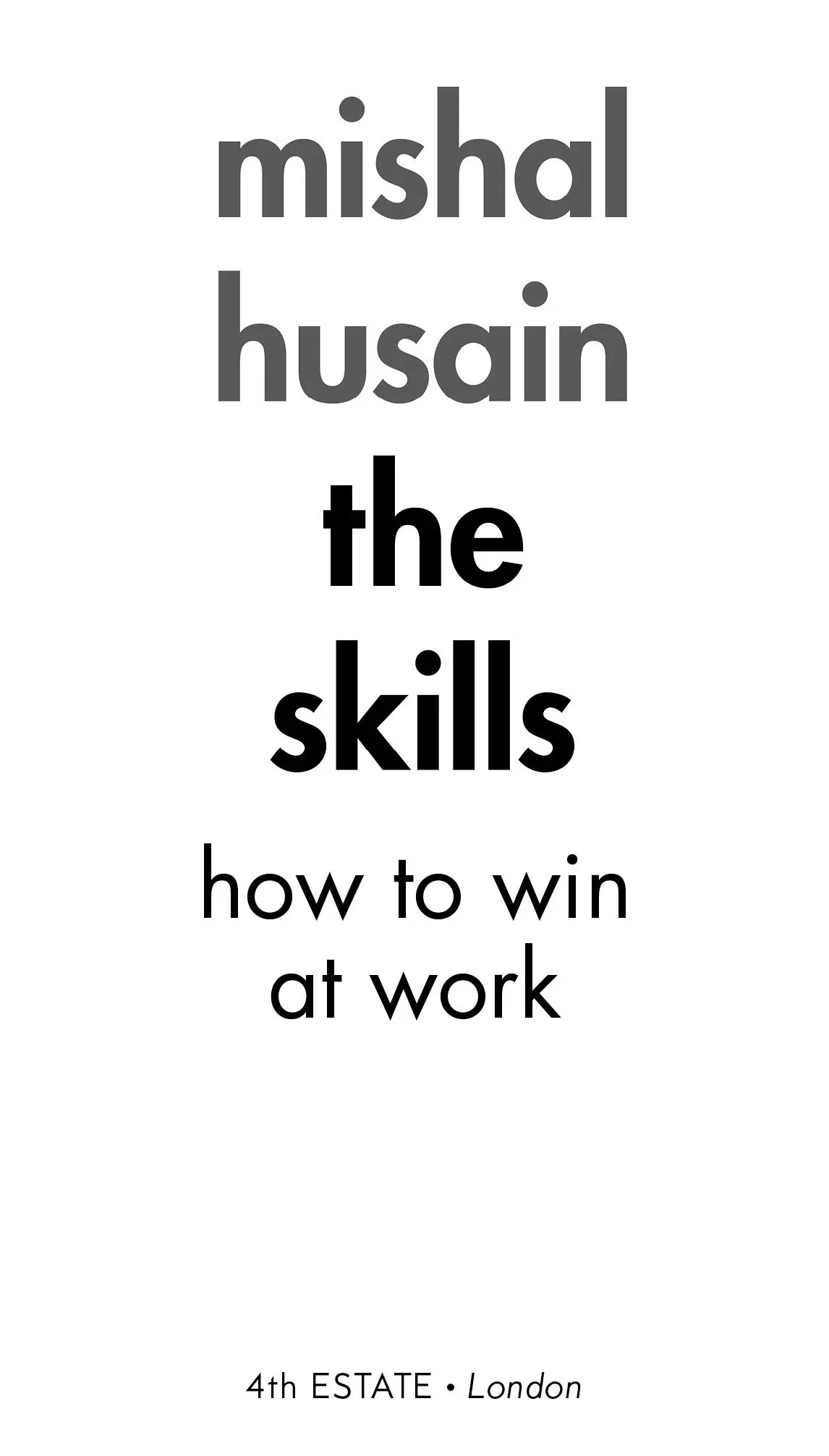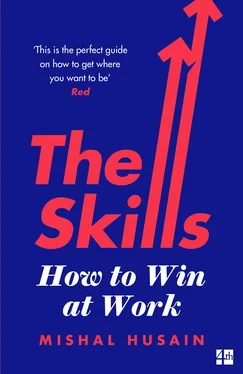
4th Estate
An imprint of HarperCollins Publishers
1 London Bridge Street
London SE1 9GF
www.4thEstate.co.uk
This eBook first published in Great Britain by 4th Estate in 2018
Copyright © Mishal Husain 2018
Mishal Husain asserts the moral right to be identified as the author of this work
Graphs here, hereand here redrawn by Martin Brown; images here redrawn by Joe Bright.
A catalogue record for this book is available from the British Library
All rights reserved under International and Pan-American Copyright Conventions. By payment of the required fees, you have been granted the non-exclusive, non-transferable right to access and read the text of this e-book on screen. No part of this text may be reproduced, transmitted, down-loaded, decompiled, reverse engineered, or stored in or introduced into any information storage and retrieval system, in any form or by any means, whether electronic or mechanical, now known or hereinafter invented, without the express written permission of HarperCollins.
Source ISBN: 9780008220662
Ebook Edition © September 2018 ISBN: 9780008220648
Version: 2019-12-10
For my parents, Shama and Tazi
Cover
Title Page
Copyright
Dedication
Introduction
Overcoming doubt • Finding my courage
Where We Are
Representation of women • Understanding the gaps • Socialisation
Growing Up Female
How we talk about girls and women • Stereotyping • Imagery • Reclaiming ambition
the skills
Planning
Longer working lives • Role models and inspiration • Five-year plans • Learning from those around you
Preparation
Information-gathering • Critical thinking • Challenging your beliefs • Evaluations and judgements
Starting Out
Navigating the first early career years • Processes that build confidence • Re-establishing yourself after breaks from work
Speaking Up
Voice, clarity and emphasis • Public speaking • The written word
Standing Up
Body language • Occupying space • First impressions
The Digital You
Social media • Women in technology • A more representative internet • Trolling
Keeping Sharp
Apprehension and anxiety • The importance of practice • Focusing on the immediate task
Owning It
Big moments and high-pressure scenarios • Appraisals and evaluations • Making a pitch
Rising Up
Developing authority • Mastering your brief • Demonstrating your knowledge
Resilience
Dealing with scrutiny and criticism • Knockbacks and failures • Holding your nerve
Balance
Managing the different elements of your life • Banishing guilt • Thinking long-term
Afterword
Acknowledgements
Notes
Image credits
Epigraph sources
Index
About the Author
About the Publisher
Authority, purpose, confidence, looking like the person in the office who is clearly going places – if there was one thing I wanted to achieve in writing this book, it was to inject a ‘ how ’ into statements about the workplace based around those words and ideas. How could they be translated into the day-to-day reality of an office, a job interview, a board meeting or a speaking engagement?
I wanted to use the tools of my own trade of broadcasting to answer that question, especially the pressures and perils of live work. But I was also conscious of the gulf between how people in jobs like mine are generally perceived – unencumbered by doubts about their performance – and my own experience of what it can be like in reality. I worried that when teenagers I spoke to in schools told me ‘You must never get nervous’, that was an assumption that might lead them to conclude that a path like mine could only be for someone blessed from birth with an unshakeable belief in their abilities.
I also knew from my own life how self-doubt can make you baulk at opportunities that – were they presented to anyone else – would be perceived as a no-brainer. When the incoming editor of the Today programme asked if I might be interested in becoming one of its presenters, baulk was exactly what I did. Despite nearly twenty years as a journalist, and a long-held ambition to present one of the BBC’s flagship programmes, I could only think of how hard the job would be – the precision required, the pressure, the scrutiny, the pre-dawn starts. I went home and told my husband it was a nice idea but I couldn’t imagine going for it. He looked incredulous. What would I say, he asked, if any of our children ducked out of a potentially great opportunity by saying it would be too hard?
I knew the answer to that one, and it pushed me to go for it. But for the first three years on Today , I fretted about almost every shift. I could not feel at ease in the role, always worrying about what might go wrong and agonising over everything that I did. But then came a moment of change – a point from which my experience started to feel different. Although an element of apprehension remained about what the working day would bring, that worry started to feel manageable and something I could channel. Looking back, it is easy to see that over time I grew into the role and began to feel more at home in it. Yet to me, at first that outcome was never a given. I find myself wondering now, what if I had bailed sometime before that moment of change? I’d be looking back and probably perceiving my uncertainty as evidence that the job wasn’t right for me. I would never have discovered what I can now appreciate – that the passage of time, perseverance and an increasing familiarity made an immense difference.
Along the way I have learned a lot about how more difficult tasks develop your capabilities, and about scrutiny and resilience. My work is on public display, with the low points as well as the high subject to immediate and sometimes fevered comment. It is often intense, both because of unusual working hours – a regular 3 a.m. alarm call – and the pressure that comes from having to quickly absorb large quantities of information. The end result is all about conveying that information in a form that best serves the audience – getting the most salient and important facts, thoughts and opinions out of interviewees, and being as clear as possible in your own thought and speech.
However much that is at the core of my working life, I have always found it much more difficult to convey information about myself, particularly in the way that is essential in the workplace. It starts with how you present your skills and aptitude at an interview and goes on through promotions and appraisals to getting the senior-most positions. As time went on, I realised I needed to deploy the essential tools of my trade – choice of words, body language, ability to distil information and deploying facts – towards my own career development as well as on the television and radio. In an age where myriad information sources and social media mean that attention spans tend to be short, those messages about yourself need to be ever more instantly understandable and memorable.
Why did I find these conversations and messages trickier than my day-to-day work and shy away from anything that I perceived as showcasing or selling it? I had certainly grown up with a strong motivation to be the best that I possibly could be – largely stemming from being the daughter of immigrants and seeing how my parents had uprooted themselves from all that was familiar, strongly driven by wanting to do their utmost for us children. Both came to the UK from Pakistan – my father as a young doctor and my mother when she married him a few years later. There was never any question of me, as their daughter, being perceived differently from my brother; for both of us, the arrival of school reports sparked a gathering around the dining table where my father would read each entry aloud. As long as we appeared to be doing our best, he was satisfied: ‘Aim high,’ he would say, ‘because if you miss what you are aiming for, you’ll still end up in a good place.’
Читать дальше













